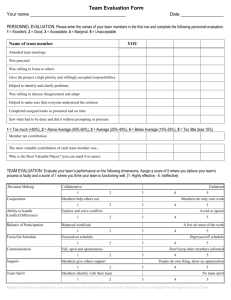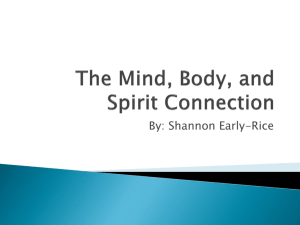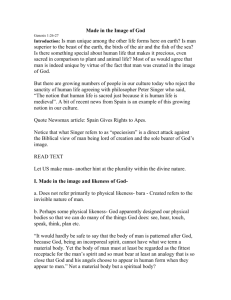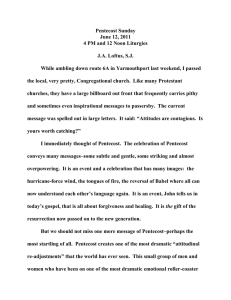Pentecost, Year B-2012 Readings: Acts 2:1-11; Gal 5:16-25; Jn 20:19-23
advertisement
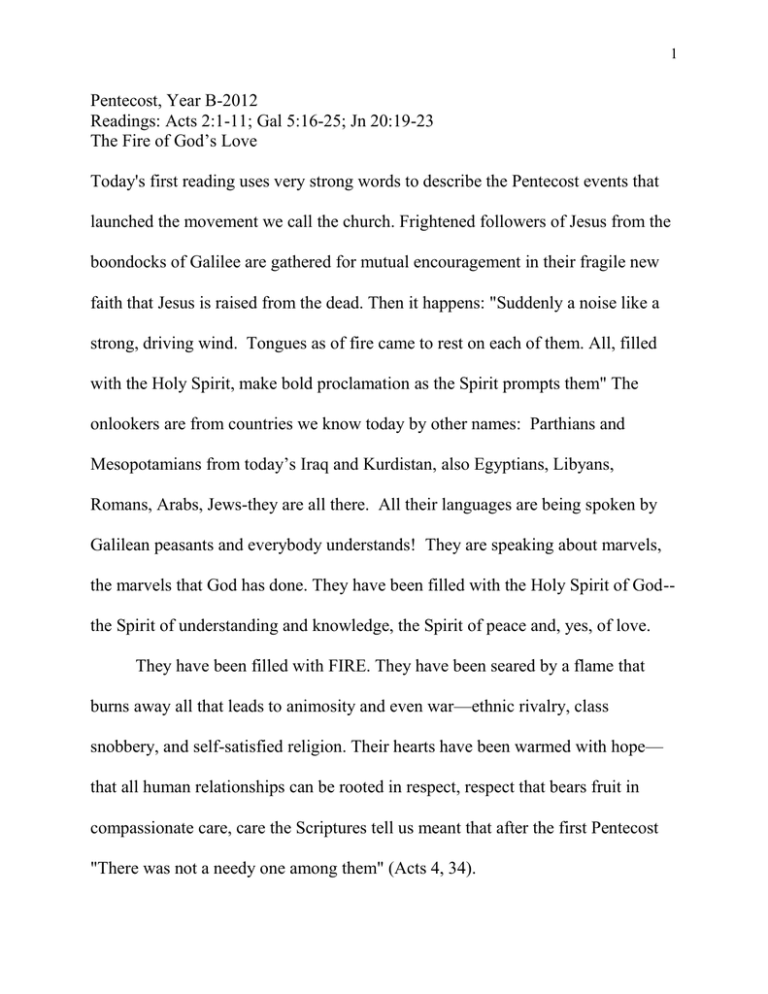
1 Pentecost, Year B-2012 Readings: Acts 2:1-11; Gal 5:16-25; Jn 20:19-23 The Fire of God’s Love Today's first reading uses very strong words to describe the Pentecost events that launched the movement we call the church. Frightened followers of Jesus from the boondocks of Galilee are gathered for mutual encouragement in their fragile new faith that Jesus is raised from the dead. Then it happens: "Suddenly a noise like a strong, driving wind. Tongues as of fire came to rest on each of them. All, filled with the Holy Spirit, make bold proclamation as the Spirit prompts them" The onlookers are from countries we know today by other names: Parthians and Mesopotamians from today’s Iraq and Kurdistan, also Egyptians, Libyans, Romans, Arabs, Jews-they are all there. All their languages are being spoken by Galilean peasants and everybody understands! They are speaking about marvels, the marvels that God has done. They have been filled with the Holy Spirit of God-the Spirit of understanding and knowledge, the Spirit of peace and, yes, of love. They have been filled with FIRE. They have been seared by a flame that burns away all that leads to animosity and even war—ethnic rivalry, class snobbery, and self-satisfied religion. Their hearts have been warmed with hope— that all human relationships can be rooted in respect, respect that bears fruit in compassionate care, care the Scriptures tell us meant that after the first Pentecost "There was not a needy one among them" (Acts 4, 34). 2 Moses saw this fire in the burning bush on Mount Sinai. It was a blaze from which he had to hide his face. Moses was afraid to look at this fire of God-the blaze of compassion, understanding, and forgiveness carried to unimaginable extremes. Teilhard de Chardin longed for this when he wrote that when men and women come to know the true power of love, "once more they will have discovered fire." This fire brings the warmth of friendship, the care of parents and family. It is the flame that flares up in all truly great loves, in the love that burns in great hopes and deeds for a world healed of division, war, and injustice. But realism demands we also ask: Why is it so hard for us to achieve these hopes? Perhaps it is because the fire—the gift of God's own life that is love— carries a cost. A great saint and doctor of the church, John of the Cross, called it the "living flame of love/That dost eternally/Pierce through my soul with so consuming heat.” Will the fire of God’s love of consume us if we get too close? Would we be better off settling for a life that doesn't aspire for this much? Don't come too near the fire and you won't get burned. But the risk is unavoidable. Not taking the risk of great love is the surest way to turn our lives to ashes. Not taking the risk of great love leads to a life of “making do,” of just coping. T. S. Eliot describes what the end of the day feels like in such a life: “The winter evening settles down . . . /The burnt out ends of smoky days . . . /The grimy scraps/Of withered leaves about your feet.” 3 There is no way to avoid being burned. Either the taste of ashes in the mouth from a low risk coping, or the flame that burns away our self-sufficiency when we risk truly great love. Again Eliot gives us the alternatives: The dove descending breaks the air/With flame of incandescent terror Of which the tongues declare. . . The only hope, or else despair. Lies in the choice of pyre or pyre— To be redeemed from fire by fire. (The Four Quartets IV) The fire of Pentecost is the fire of love, the fire of God. It burns to heal, says St. John of the Cross. The hope and love of the first Pentecost are offered to us today. This Spirit will carry us to great loves that can help us become healers of the world. So let’s not fear the cost—the heat that will burn away illusory selfsufficiency that keeps us apart. Let’s let the fire of God’s love touch us. Let’s carry the fire of the Spirit of God into deep friendships. Let’s carry the flame of God's Spirit into our communities, our nation, into a world that needs to be redeemed from fire by fire. If we do so, our lives will be marked by the fruits of God’s Spirit, especially by Joy and Peace. Both you and I surely need this Spirit. Let’s give thanks around the Lord ’s Table that the Spirit is right here among us. David Hollenbach, S.J. St. Ignatius Church May 27, 2012

